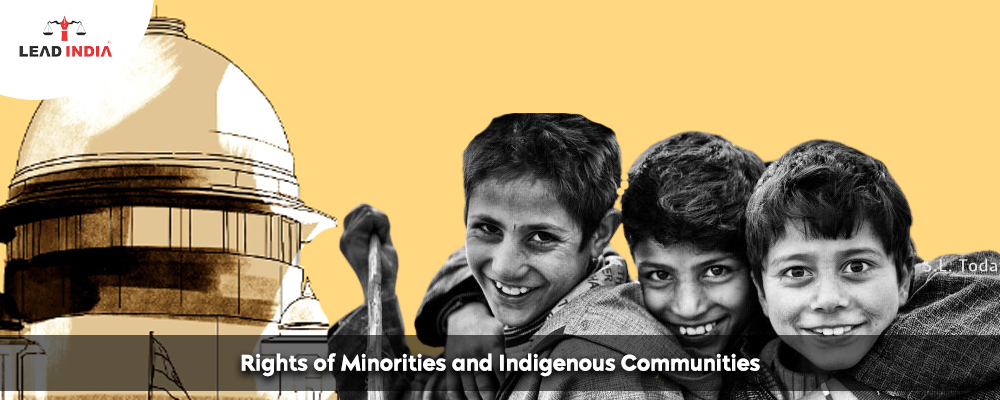There is no precise definition for the term “minority,” despite several proclamations and laws favoring them. Several countries have considered defining the term “minority” according to a specific, universally recognized definition. They were utterly unsuccessful, nevertheless, as minorities are dependent on a variety of variables, which can be linguistic, cultural, or geographic.
The Indian government formally regards no particular segment of its populace as “indigenous people,” as the term is usually understood and intended in UN usage. The government instead refers to all of its people as indigenous. In many of its operations, however, the groups of people designated as belonging to the official category of “Scheduled Tribes” (STs) are regarded as indigenous peoples. In the Indian context, it is generally acknowledged that the STs comprise mostly “indigenous peoples,” even if the terms “tribal” and “Adivasi,” which refer to indigenous or original people, are not synonymous. The constitution and legislation convey this “indigenousness” clearly and uniquely, and it is acknowledged as separate from “regionalism.”
Need A Legal Advice
The internet is not a lawyer and neither are you. Talk to a real lawyer about your legal issue

Rights of Minorities and Indigenous Communities
- Article 14 and 15: The State shall not, within the borders of India, refuse to any individual equality before the law or equal protection of the laws on the grounds of religion, race, caste, sex, or place of birth, according to Articles 14 and 15. Article 14 requires the state to treat everyone equally and to oppose discrimination based on sex, gender, religion, and other categories. The State is prohibited from treating any citizen unfairly based only on their place of birth, race, caste, religion, or any combination of these. Article 15 states that racial, ethnic, or other distinctions between people cannot be made by the state.
- Articles 29 and 30: The Indian Constitution protects cultural and educational liberties as guaranteed by Articles 29 and 30. The Indian Constitution’s Article 29 safeguards the rights of minority groups. Any community residing inside India’s borders has the right to preserve and spread its literature, customs, and language, according to Article 29(1). Article 29 (2) prohibits exclusion from state-funded educational institutions on the grounds of race, caste, religion, or language. This article, irrespective of their racial or religious background, protects citizens’ rights. For India’s minority groups, Article 30 is an essential component of legislation. Minority groups are allowed to construct and manage educational institutions to preserve their cultural identity, according to Article 30(1). Article 30(2) states that the state cannot treat any minority-run academic institution differently when it comes to aid, regardless of the institution’s language or religion.
- Articles 38 and 39: To foster individual prosperity and lessen inequalities in income, status, and opportunity, Article 38 demands the government to achieve public stability based on justice—social, financial, and political. Article 39 states that equal justice in all its forms and with no financial burden is guaranteed. It gives the government instructions to make sure that everyone has a steady job and that assets are distributed fairly for the benefit of all. It also offers opportunities and resources for children’s development, equitable recompense for commensurate work, and the prevention of economic inequity.
- Article 46: The government is empowered to take the appropriate actions to protect the weaker segments of society from social injustice and inequality as well as to advance their economic and educational prospects, according to Article 46 of the Constitution.
Case Law
TMA Pai Foundation v. the State of Karnataka (2003), In this judgment, the Supreme Court ruled that the status of “minority” for a religious or linguistic group can only be granted after taking the region’s demographics into account. The entire population of the nation cannot grant a community minority status. In response to the query on the creation of non-profit educational institutions, the court ruled that the act of establishing such institutions shall be regarded as an “occupation,” even when no profit is generated. Because there is a mission associated with working for such an organization, it is reasonable to classify these enterprises as forms of “occupation.” Encouraging others to live more fully is our mission. The court further declared that education is a benevolent endeavor in which profit is not the primary motivation, acknowledging both Article 30(1) and Article 19(1)(g). Therefore, establishing an educational institution with a non-profit goal will be classified as an “occupation.”
Lead India provides free legal advice and online information among other legal services. We offer a platform where you can speak with a lawyer and ask legal questions. Lead India’s lawyers can help you with any legal matters. Lead India offers free online legal help in India. In addition to providing legal advice online, Lead India allows users to ask professionals questions for free.





 Talk to a Lawyer
Talk to a Lawyer